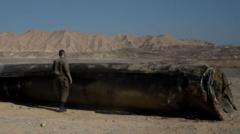Asif Rahman, a US government official, has been charged with leaking classified documents that purportedly reveal Israel's plans for a military strike on Iran. The ramifications of this leak could affect diplomatic relations and national security strategy in the Middle East.
Allegations of Espionage: US Official Charged for Leaking Israeli Military Plans

Allegations of Espionage: US Official Charged for Leaking Israeli Military Plans
The arrest of a CIA official for allegedly leaking sensitive documents regarding an Israeli plan to counter Iranian aggression raises questions about national security and international relations.
A U.S. government official has been arrested and charged for allegedly leaking classified intelligence related to Israeli military operations against Iran, spotlighting concerns about national security and its broader implications for international relations. Asif Rahman, who previously worked for the CIA and was based overseas, faces serious legal repercussions after being apprehended in Cambodia and brought to federal court in Guam.
According to reports, the leaked classified documents outlined U.S. assessments of Israel's preparations for an airstrike on Iran following a series of missile attacks initiated by Tehran. The Israeli military conducted significant air strikes against Iranian targets on October 26, in retaliation for the approximately 180 ballistic missiles fired toward Israel earlier that month.
The indictment reveals Rahman is charged with two counts of willfully transmitting classified information, although the specific contents of the leaked documents have not been fully disclosed in court filings. However, sources confirmed to CBS News that these documents indeed pertained to Israeli military plans, providing insight into the movements of Israeli military assets leading up to the attacks.
The leaked intelligence documents were reportedly marked top secret and were shareable within the Five Eyes alliance, which includes the intelligence services of the United States, United Kingdom, Canada, New Zealand, and Australia. The papers, attributed to the U.S. National Geospatial Intelligence Agency, detailed the ongoing preparations by the Israeli Air Force and their defense strategies involving munitions and drone activity.
Israel's military response came after considerable deliberation, as the Israel Defense Forces (IDF) eventually targeted multiple military sites within Iran. The strikes were said to have resulted in the deaths of one civilian and four soldiers, according to Iranian authorities. Iran's missile barrage was reportedly in retaliation for earlier attacks and the assassination of key militant leaders.
This incident not only highlights the intricate web of espionage and intelligence operations among nations but also raises critical questions regarding the safety and security measures in place for handling sensitive information. The U.S. Department of Justice has been asked for comments regarding the unfolding situation. The outcomes of this case may have lasting implications on diplomatic ties and military strategies in an already volatile region.





















